- Home
- Michael P. Spradlin
Keeper of the Grail tyt-1 Page 3
Keeper of the Grail tyt-1 Read online
Page 3
He nodded. “Tristan, in light of what has happened I realize this is not an opportune time to press the issue. However, we ride out at first light. I don’t suppose you’ve considered my offer?” Sir Thomas’ face was hopeful.
“Yes, sire, I have considered it, but I have not yet made a decision,” I said. Which was the truth. I hadn’t had time to think about it.
“Well, thank goodness you are not seriously injured. Perhaps you can sleep on it and let me know in the morning,” he said.
“Yes, sire,” I said.
He nodded and left the room.
Rising off the bed and groaning with the effort, I walked to the table. Lifting the candle, I looked at my face in the metal reflector attached to the candleholder. I had a small scratch on one cheek and a purplish bruise on my forehead, but otherwise I looked the same as always: a square face with bright blue eyes that peered out through a tangle of light brown hair.
Standing in the flickering glow of the candle, I thought of my life here at St. Alban’s. Of how the monks had taught me to read and write. How Brother Rupert had taught me to speak French, his native language. And how the abbot, stern though he was, had a fondness for numbers, teaching me all he knew of mathematics. I remembered how the brothers had worked beside me in the stables and the garden, treating me as nothing less than an equal.
In the corner was a small wooden trunk holding all of my possessions: two extra shirts, an extra set of woolen leggings and the blue woolen blanket I had been wrapped in when the brothers found me. Opening the lid of the box, I took out the small piece of parchment that was nestled in the corner beneath my extra shirts and leggings. It was the note that had been tucked within the folds of my woolen blanket on the night I was left at the abbey.
It had grown worn and wrinkled from the constant folding and unfolding. But I had not read it in some time. That note with only a few mysterious words proclaiming my “innocence” scrawled upon it and the blanket were the only connections to my true identity.
I pulled the blanket from the box, holding it to my face as I often had before. It had grown soft and the color had faded with time. As a young boy, I had tried to memorize the smell, wondering if the blanket still held the scent of my mother or father. There was a time that I believed that if I were to ever find my parents, I would be able to recognize them from that smell. But now, it held no scent at all. It was merely an old blanket, tinted blue and loosely woven, tattered along the edges with a small triangle of one corner torn away. It was the simple and worn wrap of a peasant. But it was mine.
Returning the blanket to the box, I blew out the candle. I did not know if Sir Thomas and his knights could take me to the places where the answers to my questions could be found. Who was I? Did my parents still live? Why did they abandon me? Those were the things I yearned to know, and I knew that I would never find them here. Deep into the night I tossed and turned until I felt my eyes grow heavy and sleep overtook me.
At first light the Templars were ready to leave. Astride their horses, they sat in the courtyard of the abbey waiting for me. The brothers stood on the steps as I came through the door. I had tied my belongings into a roll, fixing it about my neck so that it hung at my side. I had slept fitfully, still unsure of my choice, but in the end decided I must take this opportunity. The brothers would say it was God’s will, but I felt it was my own, and thought that unless I at least tried to find the answers I sought, I would never know peace.
I saw Sir Thomas and Sir Hugh standing at the head of the column of riders. They spoke in hushed tones but appeared to be arguing. Sir Hugh finally threw his hands up as he shot me a nasty look, then went to his horse. I guessed that he had just learned I would be accompanying the regimento and was not happy at the news. Sir Thomas just smiled and nodded at me, and he too mounted up.
The abbot’s brow was furrowed and his dark eyes gazed intently at me. Brother Rupert beamed and put his hands together in front of him, and I could hear him murmuring a prayer. I found that comforting, assuming as I was that I would need all the prayers I could get on this journey.
I ambled gingerly down the steps, still sore and stiff but suffering no permanent damage from the previous night’s attack.
“Tristan,” the abbot said. “It would seem that you have made a decision.”
“Yes, Father. I have decided to accept Sir Thomas’ offer and accompany the knights to the Holy Land.”
“Are you sure you feel well enough to travel?” he asked.
“Yes, Father, I feel much better. I was not seriously hurt,” I said.
“I see.” The abbot was quiet for a moment as he considered me. Then he gave me a rare smile. “We knew this day would come,” he finally said. “Admittedly, we did not expect it to happen so soon. But we realized that someday you would leave us. This is a sad day for St. Alban’s.”
I was moved by the abbot’s words. “Thank you, Father,” I said.
Brother Rupert stepped forward, holding out a small leather pouch. Taking it I could hear the clink of coins and feel the weight of them in my hand.
“It’s only a few crosslets,” he said. “We took up a collection amongst the brothers. You might need some essentials when you reach Dover. This isn’t much, but it should help.”
I was too moved to speak. The brothers had all taken vows of poverty, and any money they earned went directly to the abbey. This “collection” must have come from the treasury. This likely explained the pained look on the abbot’s face.
“Brother Rupert,” I said, “I appreciate the thoughtfulness, but I cannot accept this…” I started to hand it back to him, but his hands closed over mine, keeping the purse clutched in my hand.
“Tristan, you are one of us. We would not send a brother out into the world empty-handed. You have earned this with your sweat and your kind heart. Take it and think no more of it,” he said.
Before I could say anything, Sir Hugh broke in. “If you are coming with us, boy, make up your mind. We’re leaving now, and you have no mount, so you’ll have to keep up. Say your good-byes and step lively.” His voice was cold, and tinged with something unsettling.
Brother Rupert shot Sir Hugh a rather nasty look for a monk. He squeezed my hands and clapped me on the shoulder.
“Where is Brother Tuck?” I asked. “I can’t leave without saying good-bye…”
Just then, I heard a commotion to my left and turned to see him coming around the side of the abbey leading Charlemagne, one of our plow horses. Charlemagne wore the ancient saddle that the brothers used on occasion. Brother Tuck beamed at me as he led the horse to a stop before me.
“This is the last of our gifts,” said Brother Rupert. “He will get you to Dover-slowly, but you should be able to keep up. There you can leave him at the stable on the grounds of St. Bartholomew. The priests will care for him until our next trip there.”
I looked at the abbot, who nodded his approval. Brother Tuck smiled, grasping me in a tremendous bear hug that took me off my feet. He set me down, taking my face in his giant hands, kissing me on each cheek. I would miss him most of all. Though he could not hear or speak, Brother Tuck had an uncanny ability to learn and know what was going on about him. He understood I was leaving, and his gesture of kindness touched me deeply.
I looked at the rest of the brothers. They were my family. “Good-bye. I will miss all of you. I promise I’ll return someday. Soon, I hope.”
With that, Brother Tuck boosted me onto the back of Charlemagne. As I settled into the saddle, he handed me the reins. Sir Hugh gave the command to move out. The knights were spectacular horsemen, their chargers leaping forward in unison. Sir Thomas had taken a place near the rear of the column, and as he passed by me, he reined his horse slightly, motioning for me to ride alongside him.
I gently nudged Charlemagne with my heels and he began moving, slowly, as he was used to the plow and not the saddle. He was a gentle soul as horses go, but speed was not his gift. I had my work cut out for me to keep up with
the warhorses of the regimento.
This docile horse carrying me away to a new life was my last gift from the hearts of the finest men I’d ever known.
DOVER, ENGLAND
6
After many hours in the saddle the sun moved lower in the western sky. We crested a hill and below us lay the city of Dover. From the hilltop I could smell the ocean. The city, which had been just a small village when I had visited three years ago, had changed much.
On a hill to the north, a large castle was under renovation. I saw men climbing the wooden scaffold encasing the castle keep, crawling up and down ladders like ants. I could see ropes moving, lifting rocks and barrels of sand as the stones were set in place by men at the top of the walls.
Below us the city spread out beneath the white cliffs that rose so beautifully above the ocean. A large marketplace teeming with booths and tents occupied the center of the town. As we rode down the ridge onto the main street leading into the city, I became increasingly aware of the noise.
Vendors in the marketplace called out to everyone. Passing a small inn, I heard the shouts and songs of happy revelers coming from within. The sounds of a blacksmith banging away at a piece of hot steel rang through the air. We were swept away in a wave of bedlam. Even Charlemagne began shaking his head, snorting in disgust at the buzz of activity that surrounded us.
“Have you ever seen a city before?” asked Sir Thomas, noticing the look of awe upon my face.
“Yes, sire, I came here with the brothers a few years ago. But it seemed much smaller then. Not as many people. And quieter.”
“No doubt,” Sir Thomas said. “War has been good for Dover. Many of the Crusaders gather here to board ships for Outremer. King Richard wants the castle reinforced and strengthened. King Philip of France is an ally for now, but allies can quickly turn into enemies. Any force attacking England by sea would make Dover a likely target, so the castle must be ready and able to slow down any invaders until reinforcements can arrive. When I first came here as a boy, Dover was a sleepy fishing village. Now the fishermen are far outnumbered by the innkeepers and the merchants.”
Riding farther into the city, we eventually came upon several large buildings surrounded by a gated fence. Above the entrance flew a banner divided in color, with the bottom half brown and the top half white.
“See the Templar banner, Tristan?” Sir Thomas said. “That flag flies over every Templar commandery. The colors symbolize the heaven above in white, and the earth below in brown. No matter where you travel, you need only look for that banner and you’ll be welcomed as a brother.”
We entered through the main gate. As we reined up, knights and squires hurried out of the building, calling out greetings. As we dismounted, they began to mingle, talking excitedly with one another.
“Our order has a commandery like this in most major cities and towns throughout Europe. Any Templar can rest here, train or reprovision,” Sir Thomas said.
He was interrupted by the approach of a large man with a full beard that hung nearly to his chest.
“Thomas!” he shouted, striding briskly up to Sir Thomas, clapping him vigorously on the shoulders. He was at least a head taller than Sir Thomas and easily the biggest man I’d ever seen, larger even than Brother Tuck. His arms were as thick as small trees, and his hands were the size of hams.
“You smell like a sweaty horse and you look worse,” he bellowed.
Sir Thomas laughed. “Sir Basil, you’ve grown thinner. Surely you’ve eaten since I last saw you?” he asked with a smirk.
Sir Basil roared with laughter, patting his large stomach. “Aye, once I had words with the cook. The food was barely edible when I first arrived. We Templars fight on our stomachs, and this kitchen was in the most pitiful shape. Worst of any commandery I’ve ever seen. Now it has a larder fit for fighting men-I’ve taken care of that. No more cabbage soup and bread. We have real food now. Meats and cheeses galore! But I’ve grown weary keeping the cook in line!”
Sir Thomas smiled. “It is good to see you, Brother Basil. Let me introduce to you the newest member of our regimento. This is Tristan of St. Alban’s. He has been living there with the monks, and has joined us to serve as my squire.”
“Well, well, well,” said Sir Basil. “Monks, you say? Welcome, young Tristan, welcome! A squire to Sir Thomas? Did he not fully explain to you? You can’t be a squire unless you’re serving a real knight! Sir Thomas drinks like a baby camel and fights like a woman. Why, he’s no soldier! In our last battle, I had to lash him to a tree to keep him from running away like a scared kitten. I faced down a dozen Saracens single-handedly while he cowered in the brush. If it’s squire-hood you’re interested in, perhaps you should ride with me. Then you’ll see how a real knight lives!”
I looked back and forth between them, puzzled. It would seem that they were friends, yet Sir Basil had just gravely insulted Sir Thomas.
Sir Thomas saw the look on my face and began laughing.
Then Sir Basil joined in, pounding me on the back. “We’re joking, boy, joking! Why, there is no finer knight than Sir Thomas. You listen closely to him and you’ll grow up to be the Master of the Order! Welcome, lad! Welcome!”
I’d never encountered someone with such energy. Sir Basil pumped my hand again, then moved off quickly to greet the other knights in our group. His voice drowned out everyone as he moved among them, shouting out good-natured insults.
Sir Thomas grinned as he watched Sir Basil work his way through the crowd. Then he turned to me. “Well, Tristan, there is much to do. First, you should return the brothers’ horse to the church stables. Then be back here as quickly as you can. We need to get you outfitted. Our ships depart for Outremer soon, and by then we’ll be well into your training. So, off with you now.”
The church of St. Bartholomew was not far away, and in fact I could see the steeple from the courtyard where we stood. Sir Thomas took his horse by the reins off to the stables, and I turned Charlemagne back toward the gate.
The sturdy plow horse was tired and moved along without much argument. Dover was alive with activity, and I felt I would never grow used to the noise and commotion. I passed busy shops and inns and shouting vendors in the marketplace. I was assaulted by the smells of cooking meat and smoke from the fires of the blacksmiths’ forges that lined the street. Underneath it all there was the unpleasant smell of hundreds of human beings living in close quarters.
In truth I was not watching where I was going, and because of this, I was nearly run over by a column of riders that had burst into an intersection of the street just as I was about to cross through. I had never seen such resplendent men-at-arms, and as I pulled Charlemagne quickly to a stop, one of them shouted harshly at me.
“Watch out, boy. Move that miserable plow horse and make way for the King’s Guards!”
I had nearly been trampled by a mounted detail of the King’s Guards! And not just any detail, for at the head of the column a rider carried a brilliant scarlet banner on which were embroidered three magnificent golden lions. I had never seen it before but had heard many travelers at the abbey describe it. It was the coat of arms of the King, and as I stared in disbelief, there he was, riding past me on the most magnificent white stallion I had ever seen.
Richard the Lionheart had arrived in Dover.
7
The news that the Lionheart had arrived spread quickly through the city. The King’s Guards had been forced to slow by the crowds of people in the intersection, and the delay had given me a brief moment to study King Richard. His horse was magnificent, as white as a cloud. He wore a gleaming coat of mail and over that a bright red tunic, embroidered with the same three golden lions that flew upon his banner. He wore nothing on his head, certainly no crown, but not even a helmet. His beard was full but neatly trimmed, unlike the manner of the Templars. He carried a large battle sword at his belt, and wore leather riding breeches.
As the people of Dover realized the King was riding through the main thorough
fare, they called out shouts and he waved in greeting. But before a crowd could gather, the riders were gone, and I followed their progress as they headed to the castle gate.
If Dover had been noisy before, the King’s arrival had given its citizens even more cause for boisterous shouts and laughter. As I resumed my journey to the church, the news moved visibly from person to person and shop to shop. Several folks called out to me, asking if I knew that the King had arrived, and I answered back that, indeed, I had seen him with my own eyes.
When I arrived at the grounds of St. Bartholomew, one of the priests there was delighted to show me to the nearby stable used by the church. He was familiar with the brothers of the abbey and agreed to care for the horse until they arrived to take him home. I led Charlemagne into his stall and saw that he was fed and watered. I felt reluctant to leave him, knowing that in so doing, I was severing my last connection to St. Alban’s.
Charlemagne seemed to sense this as well. While he silently munched his hay, I patted him and he turned, gently nuzzling my neck. It felt as if he knew we would not see each other again and wished to say good-bye.
The priest had stood idly by while I stabled the horse, and he quietly began to fidget and cough. Knowing that I’d taken up enough of his time, I thanked him again and made my way back to the street. I hoped there would be a meal soon upon my return to the Commandery, for I’d grown hungry and thirsty as well. Perhaps I would have a chance to see what wonders Sir Basil had done with the kitchen. Sir Thomas had mentioned that my training as a squire would begin straightaway, but I hoped he’d meant after we’d had a chance to rest somewhat from our travels.
Dusk was falling and the sun danced along the tops of the hills that lay to the west. The streets and buildings were bathed in gold. And the smells of evening meals were everywhere, so much so that my stomach growled.
Approaching the Commandery, I noticed Sir Hugh standing outside the gates with another Templar knight, one I’d not seen before, the two of them speaking in hushed tones to two other men who wore the uniform of the King’s Guards. Whether they were members of the same squad that had just ridden through town, or another stationed here at Dover, I could not tell, but Sir Hugh was talking to them anxiously, as if agitated about something.

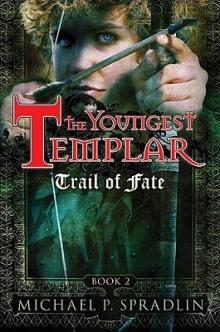 Trail of Fate
Trail of Fate Alcatraz
Alcatraz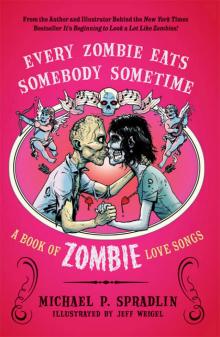 Every Zombie Eats Somebody Sometime
Every Zombie Eats Somebody Sometime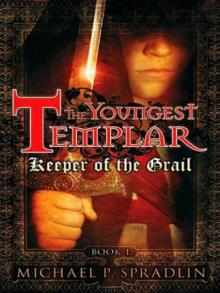 Keeper of the Grail tyt-1
Keeper of the Grail tyt-1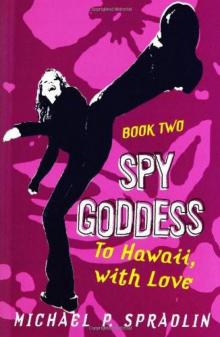 To Hawaii, with Love
To Hawaii, with Love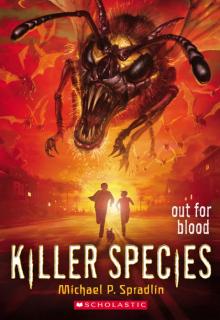 Out for Blood
Out for Blood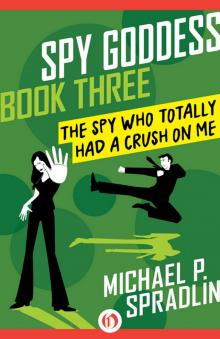 The Spy Who Totally Had a Crush on Me
The Spy Who Totally Had a Crush on Me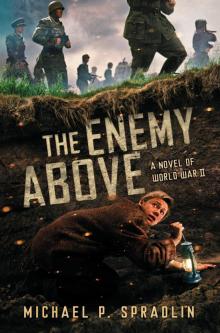 The Enemy Above
The Enemy Above Menace From the Deep
Menace From the Deep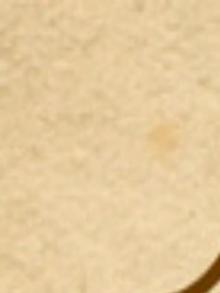 It's Beginning to Look a Lot Like Zombies
It's Beginning to Look a Lot Like Zombies Feeding Frenzy
Feeding Frenzy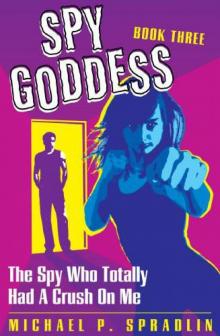 3 The Spy Who Totally Had a Crush on Me
3 The Spy Who Totally Had a Crush on Me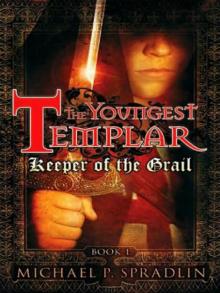 Keeper of the Grail
Keeper of the Grail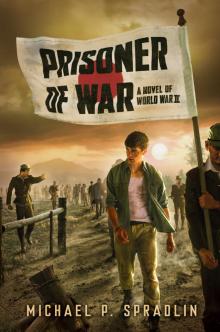 Prisoner of War
Prisoner of War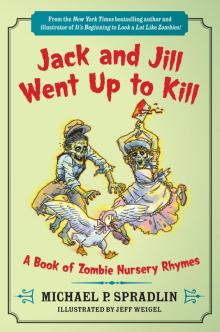 Jack and Jill Went Up to Kill
Jack and Jill Went Up to Kill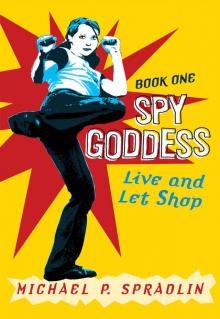 Live and Let Shop
Live and Let Shop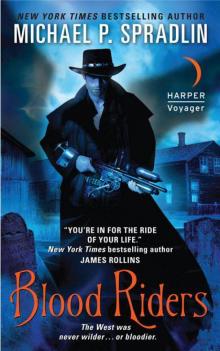 Blood Riders
Blood Riders Ultimate Attack
Ultimate Attack